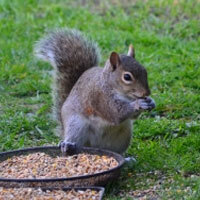Habits
The Eastern gray squirrel is typically active, in Georgia, during the earlier and later hours of the day. These squirrels hoard food in numerous scattered locations. Sometimes they store food in Atlanta attics, for future retrieval. Some food reserves are short-term and others are not retrieved until months later. Atlanta squirrel removal is a common service needed when this annoying behavior is in your attic.
 Squirrels have a very precise memory of these reserves. Sometimes they pretend to bury nuts if they sense that they are being watched. The eastern gray squirrel creates a nest, known as a “drey”, in the forks of branches. Gray squirrels have a unique ability to descend a tree headfirst.
Squirrels have a very precise memory of these reserves. Sometimes they pretend to bury nuts if they sense that they are being watched. The eastern gray squirrel creates a nest, known as a “drey”, in the forks of branches. Gray squirrels have a unique ability to descend a tree headfirst.
Male and female gray squirrels may share a nest during the winter and breeding periods. Squirrel breeding periods are twice a year. In order to stay warm during the winter, gray squirrels frequently nest in attics or exterior walls of homes. This creates a need for Atlanta squirrel removal companies.
Communication between grey squirrels is both vocal and physical to converse among each other and alert about predators. Predominantly squirrels ingest tree bark, berries, seeds, nuts and acorns. They populate residential areas where they can easily invade bird feeders.
When their usual food sources are limited by natural and man-made food shortages, grey squirrels will feed on frogs, bugs, small rodents including other squirrels, bird eggs and small birds.
Habitat
Eastern grey squirrels populate developed, dense woodlands. Theses critters are native to the eastern and midwestern United States including the greater Atlanta area of Georgia, they tend to evade extreme heat, and they do not hibernate.
If these wooded areas are not available in urban and suburban areas they will use your home and yard for food sources and shelter. Oak-hickory hardwood forests are favored over coniferous woodlands and they normally prefer building their dens on bulky tree branches, inside hollow trunks of trees, inside attics or crawl spaces.
Their dens are commonly lined with moss, undergrowth, dried grass and feathers, or attic insulation and the cover of the den is built last. These materials contribute to the insulation of the den decreasing heat loss during the cooler months.
Atlanta Squirrel Removal
Typical gray squirrel behavior in Atlanta may lead these critters into your home or building roof and attic. The attic creates a great protective environment for them to live in and raise young. This behavior is the primary reason people request Atlanta squirrel removal services for their home and business.
Grey squirrels reproduce year round but there are two peaks of breeding in the Spring and Fall. These younger squirrels, if not trapped and removed from the attic, will return and have more babies, continuing the cycle.
Trapping squirrels can be a difficult task for a homeowner. Not everyone understands proper trapping techniques. Squirrels in your home, crawlspace or attic can be very frustrating.
Although there is no real, effective squirrel repellant, like moth balls or strobe lights, there are quite a few gimmicks online and at the big box stores. These repellents are a waste of time and an added expense to the process. They are not effective for Atlanta squirrel removal. Trapping is the most effective way of dealing with an aggravating gray squirrel problem.
If you do not understand how squirrels move and what makes a squirrel interested than you may decide to leave Atlanta squirrel removal and trapping to the professional wildlife controller like Georgia Squirrel Removal trappers.
Georgia Squirrel Removal catches thousands of squirrels from hundreds of homes every year. Once squirrel removal is complete the proper steps can be taken to exclude them permanently. After this process is complete the appropriate maintenance suggestions should be followed for the property
